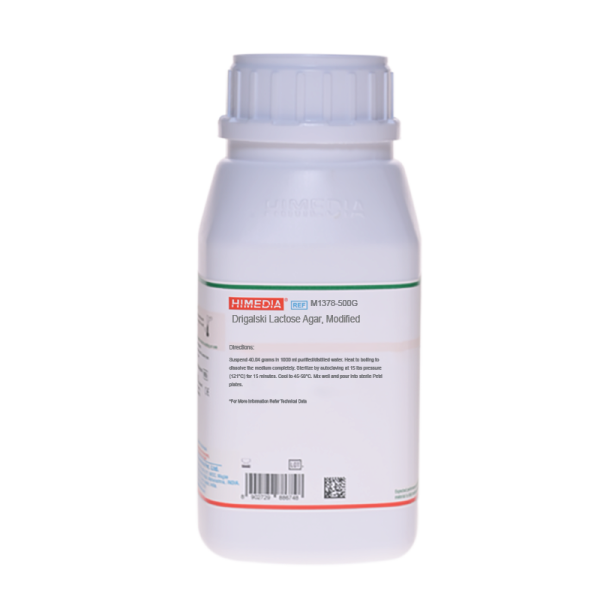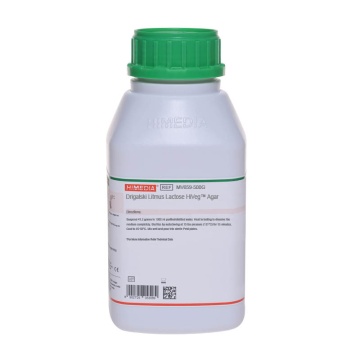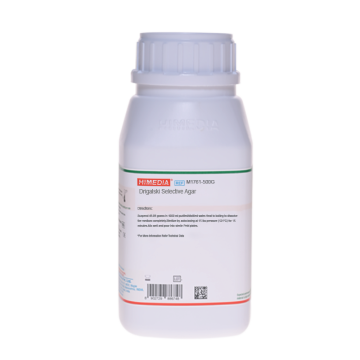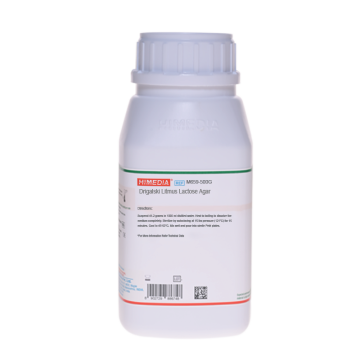 Your enquiry has been submitted
Your enquiry has been submitted
Drigalski Lactose Agar, Modified
Intended Use
A non selective, differential medium for the detection of enteric pathogens.
Composition**
| Ingredients | g/L |
|---|---|
| HM peptone B# | 4.000 |
| Peptone | 10.000 |
| Lactose | 10.000 |
| Bromothymol blue | 0.040 |
| Agar | 16.000 |
Final pH (at 25°C): 7.4±0.2
**Formula adjusted, standardized to suit performance parameters
# Equivalent to Beef extract
Directions
Suspend 40.04 grams in 1000 ml purified / distilled water. Heat to boiling to dissolve the medium completely. Sterilize by autoclaving at 15 lbs pressure (121°C) for 15 minutes. Mix well and pour into sterile Petri plates. Cool to 45-50° С.
Principle And Interpretation
Drigalski Lactose Agar, Modified is based on the original medium developed by Drigalski and Conrad (1) for the detection of enteric pathogens.
HM peptone B and peptone provide nitrogeneous nutrients to the organisms, while lactose is the fermentable carbohydrate. Bromothymol blue is the pH indicator in the medium. Non-lactose fermenting (enteric) pathogens form blue to green colonies whereas lactose fermenting coliform organisms form yellow colonies due to acid production and decrease in pH (2).
Type of specimen
Clinical samples - Urine, stool
Specimen Collection and Handling:
For clinical samples follow appropriate techniques for handling specimens as per established guidelines (3,4).
After use, contaminated materials must be sterilized by autoclaving before discarding.
Warning and Precautions :
In Vitro diagnostic Use only. For professional use only. Read the label before opening the container. Wear protective gloves/protective clothing/eye protection/face protection. Follow good microbiological lab practices while handling specimens and culture. Standard precautions as per established guidelines should be followed while handling clinical specimens. Safety guidelines may be referred in individual safety data sheets
Limitations :
- Individual organisms differ in their growth requirement and may show variable growth patterns on the medium.
- Each lot of the medium has been tested for the organisms specified on the COA. It is recommended to users to validate the medium for any specific microorganism other than mentioned in the COA based on the user's unique requirement.
- Further biochemical and serological tests must be carried out for further identification.
Performance and Evaluation
Performance of the medium is expected when used as per the direction on the label within the expiry period when stored at recommended temperature.
Quality Control
Appearance
Light yellow to greenish yellow homogeneous free flowing powder, may have slight dye particles
Gelling
Firm, comparable with 1.6% Agar gel.
Colour and Clarity of prepared medium
Green coloured, clear to slightly opalescent gel forms in Petri plates
Reaction
Reaction of 4% w/v aqueous solution at 25°C. pH: 7.4±0.2
pH
7.20-7.60
Cultural Response
Cultural characteristics observed after an incubation at 35-37°C for 18-24 hours.
| Organism | Inoculum (CFU) | Growth | Recovery | Colour of colony |
|---|---|---|---|---|
| Klebsiella pneumoniae ATCC 13883 (00097*) | 50-100 | good-luxuriant | >=70% | yellow |
| Escherichia coli ATCC 25922 (00013*) | 50-100 | luxuriant | >=70% | yellow |
| Salmonella Typhi ATCC 6539 | 50-100 | luxuriant | >=70% | blue to green |
| Shigella flexneri ATCC 12022 (00126*) | 50-100 | luxuriant | >=70% | blue to green |
| Pseudomonas aeruginosa ATCC 27853 (00025*) | 50-100 | good | >=70% | blue-green |
Key: *Corresponding WDCM numbers.
Storage and Shelf Life
Store between 10-30°C in a tightly closed container and the prepared medium at 20-30°C. Use before expiry date on the label. On opening, product should be properly stored dry, after tightly capping the bottle in order to prevent lump formation due to the hygroscopic nature of the product. Improper storage of the product may lead to lump formation. Store in dry ventilated area protected from extremes of temperature and sources of ignition. Seal the container tightly after use. Product performance is best if used within stated expiry period.
Disposal
User must ensure safe disposal by autoclaving and/or incineration of used or unusable preparations of this product. Follow established laboratory procedures in disposing of infectious materials and material that comes into contact with clinical sample must be decontaminated and disposed of in accordance with current laboratory techniques (3,4).
Reference
- Drigalski V. and Conrad H., 1902, Z. Hyg. Infektionskr., 39:283.
- MacFaddin J., 1985, Media for Isolation-Cultivation-Identification-Maintenance of Medical Bacteria, Vol. I, Williams and Wilkins, Baltimore.
- Isenberg, H.D. Clinical Microbiology Procedures Handbook 2nd Edition.
- Jorgensen, J.H., Pfaller, M.A., Carroll, K.C., Funke, G., Landry, M.L., Richter, S.S and Warnock., D.W. (2015) Manual of Clinical Microbiology, 11th Edition. Vol. 1.
| Product Name | Drigalski Lactose Agar, Modified |
|---|---|
| SKU | M1378 |
| Product Type | Regular |
| Physical Form | Powder |
| Origin | Animal |
| Packaging type | HDPE |
| References | 1.Drigalski V. and Conrad H., 1902, Z. Hyg. Infektionskr., 39:28 |
| Customized Product Available | No |









